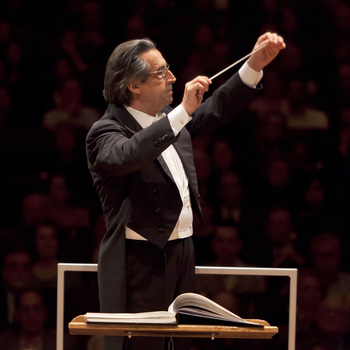Chicago Symphony closes Carnegie stand with somber and blazing Shostakovich

Riccardo Muti conducted the Chicago Symphony Orchestra in Shostakovich's Symphony No. 5 Sunday afternoon at Carnegie Hall. Photo: Richard Termine.
As much as any work by the Soviet-era composer Dimitri Shostakovich, his Symphony No. 5 lets the listener combine music appreciation with Kremlinology.
Shostakovich himself described the Fifth Symphony, written in 1937, as a contrite response to a “justified” drubbing his opera Lady Macbeth of the Mtensk District received in Pravda. It took a well-reviewed Fifth to return him to favor among the music critics of the state — and in Stalin’s Russia, only one critic mattered.
But you have to wonder, with good reason, how humbled Shostakovich really was. As performed on Sunday afternoon at Carnegie Hall by the visiting Chicago Symphony Orchestra, the Fifth radiated traditional beauty of form and an accessible sense of melody — traits supposedly missing from the disfavored opera.
Even so it sounded reluctant to let go of its inner conflicts. A somber spirit held at nearly every turn on Sunday, and not just in the expected places — like the dank piano triads and uphill-downhill unison lines of the first movement, with its pronounced air of struggle. It was there also in the playful string dances of a second-movement Allegretto and in the blazing major-key coda.
The CSO and conductor Riccardo Muti attacked that galvanizing finale with real fanfare and gusto, sending up dynamic, high-decibel fireworks as if to throw light across the preceding forty minutes of moody contemplation.
But it was the long and plaintive third movement that seemed to absorb Muti and the ensemble most. More than any section of Shostakovich’s alleged mea culpa, the solitary Largo drew out the orchestra’s most soulful playing. Maybe the real message to Shostakovich’s critics resided there, where the collective recedes and single instrumental voices stand out.
The program opened with a brisk Overture in G Major by Cherubini, a composer better known for his comic operas. Muti and company handled the quick-change artistry of the overture with a suitably light touch, from its gentle beginning to its galloping rejoinder, on through sections that merged the competing themes. Cherubini’s comical side surfaced in the finale: Horns popped up and down like hecklers coaxing a few more retorts from the orchestra before letting the proceedings conclude.
Liszt’s Les préludes, a weightier construction than Cherubini’s darting curtain-raiser, let the CSO turn up the volume and the bass frequencies without bogging down. The sensation of a storm-tossed ship in rising seas was as vivid as the pastoral quiet of harps and woodwinds conversing.